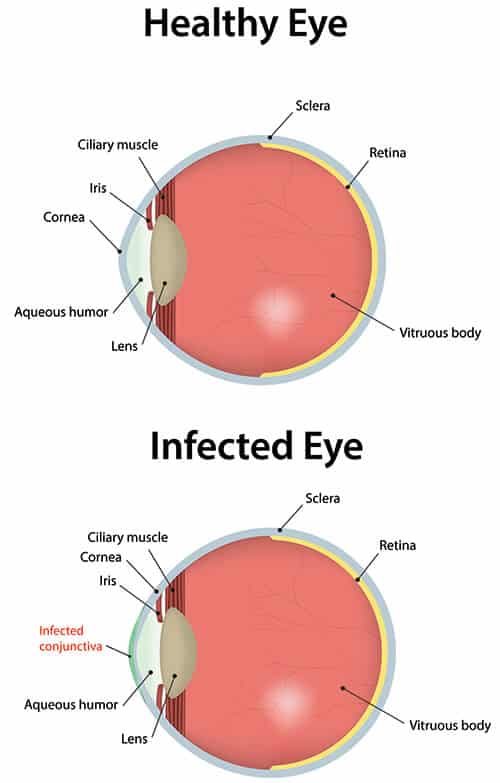Pink Eye Treatments
Pink Eye Treatments
Are you experiencing redness, itching, or discharge in one or both of your eyes? You may be suffering from pink eye, also known as conjunctivitis, a common eye condition that can be caused by various factors. At All Eye Care, P.A., we offer pink eye treatments to provide rapid relief and comprehensive care for your ocular health. Led by Dr. Rugwani, our compassionate team is committed to identifying the underlying cause of your pink eye and delivering personalized treatment to restore comfort to your eyes.
Understanding Pink Eye: Overview, Types, and Causes
Pink eye, or conjunctivitis, is an inflammation of the conjunctiva, the thin, transparent membrane that covers the white part of the eye and lines the inner surface of the eyelids. It can occur in one or both eyes and may be accompanied by symptoms such as redness, itching, tearing, discharge, and crusting of the eyelids.
Types
Viral Conjunctivitis: Viral pink eye is often caused by the same viruses responsible for the common cold or upper respiratory infections. It is highly contagious and can spread through direct contact with contaminated hands or objects.
Bacterial Conjunctivitis: Bacterial pink eye is caused by bacterial infection, most commonly by Staphylococcus aureus or Streptococcus pneumoniae. It can result from poor hygiene, contact lens wear, or exposure to contaminated water.
Allergic Conjunctivitis: Allergic pink eye is triggered by allergens such as pollen, pet dander, dust mites, or certain irritants. It is characterized by itching, redness, and watery discharge, often accompanied by other allergic symptoms such as sneezing and nasal congestion.
Chemical Conjunctivitis: Chemical pink eye can occur when the eyes are exposed to irritants such as chemicals, smoke, fumes, or foreign bodies. It typically resolves once the irritant is removed and the eyes are flushed with water.

Causes
Pink eye can be caused by various factors, including viral or bacterial infections, allergies, irritants, or underlying medical conditions such as dry eye syndrome or autoimmune diseases.
Pink Eye Treatments and Management
A thorough evaluation by an eye care professional is essential for determining the underlying cause of pink eye and guiding appropriate treatment. Depending on the type and severity of pink eye, treatment may include:
Topical Antibiotics
Antibiotic eye drops or ointments may be prescribed for bacterial conjunctivitis to help eliminate the underlying bacterial infection and reduce inflammation.
Antiviral Medications
In cases of viral conjunctivitis, antiviral eye drops or oral medications may be recommended to alleviate symptoms and shorten the duration of the infection.
Antihistamine Eye Drops
For allergic conjunctivitis, antihistamine eye drops or mast cell stabilizers may be prescribed to relieve itching, redness, and swelling associated with allergic reactions.
Artificial Tears
Lubricating eye drops or ointments can help soothe irritation, flush out irritants or allergens, and improve comfort for individuals with pink eye.
Cold Compresses
Applying cold compresses to the eyes can help reduce inflammation, alleviate itching, and provide symptomatic relief for pink eye.
Hygiene Practices
Practicing good hygiene, such as frequent hand washing, avoiding touching or rubbing the eyes, and cleaning contact lenses properly, can help prevent the spread of pink eye and reduce the risk of recurrence.
Frequently Asked Questions About Pink Eye Treatments
At All Eye Care, P.A., we’re dedicated to providing compassionate and effective pink eye treatments to help you find rapid relief and restore comfort to your eyes. Schedule your appointment with Dr. Rugwani today and take the first step toward overcoming pink eye and improving your ocular health.

